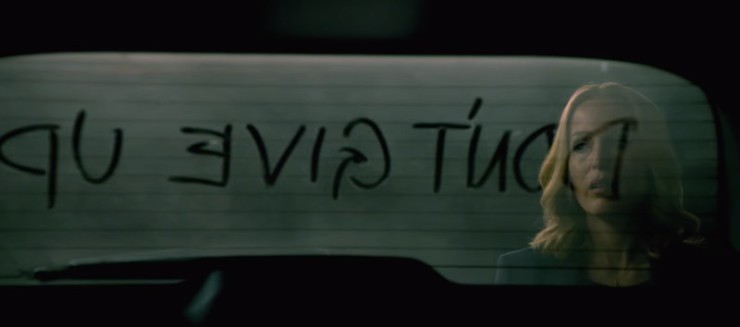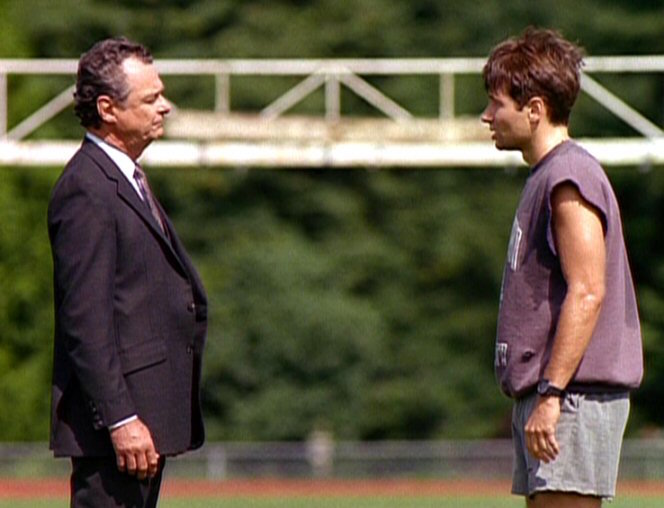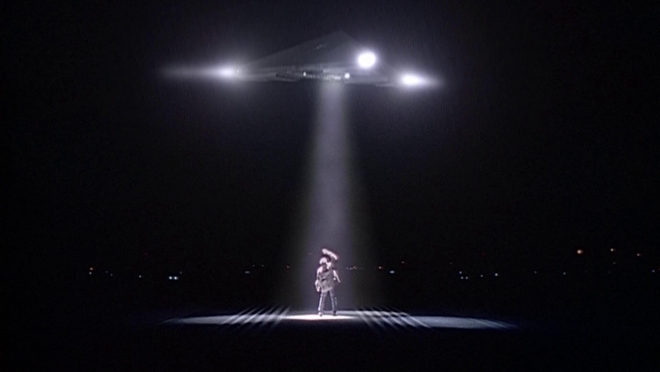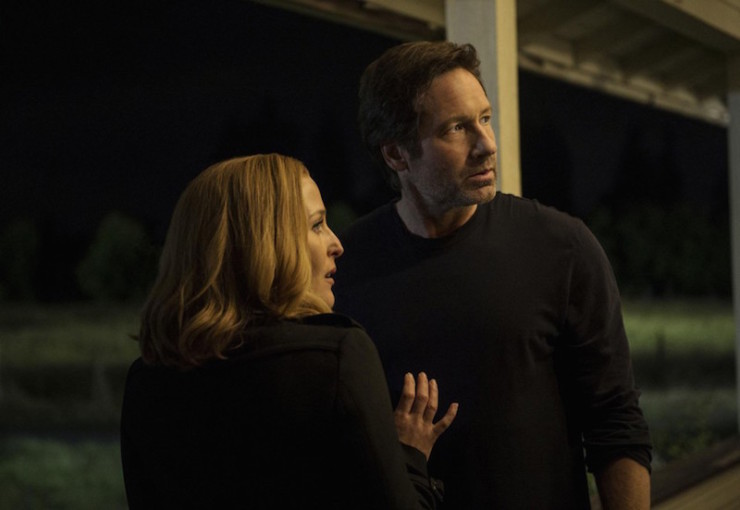Since the series premiered in early February in the UK, we’re now three weeks into The X-Files sequel on this side of the pond. It’s been an interesting experience so far, almost a Greatest Hits tour with added missing time, cynicism, and nowhere near enough AD Skinner. It’s also, so far, given us the most interesting element of the new series in a line that goes by so quickly it’s almost thrown away.
Halfway through “My Struggle,” around the time the massive cognitive dissonance at seeing Jeff Winger helping the leads out is fading, Mulder has a meeting with his source. It’s typical X-Files stuff; a light seasoning of facts and a thick, foggy soup of implication and paranoiaspeak.
Which is why one line really jumped out: the crack about “warring alien races setting fire to one another.” It isn’t quite sprinted past, but it does go by with noticeable haste. That’s understandable, given that it’s essentially mocking the previous arc plot. Though it’s also mocking the audience who followed along for nine years—the same audience the series is courting.
Gutsy stuff. And when you look at it, and the revelation we get about the conspiracy’s true nature, it speaks to a fundamental ideological shift within the series.
To understand what that is, we need to start with Fermi’s Paradox. This expresses the conflict between the apparently vast universe, the mathematical likelihood of intelligent life occurring off-Earth, and the total failure we’ve had in detecting it. SETI (the Search for Extraterrestrial Intelligence) defines it informally as “Our galaxy should be teeming with civilizations, but where are they?”
It’s a compelling argument and there’s a raft of possible solutions to it, all of which are deliciously loaded down with plot hooks. My favourite is probably Stephen Baxter’s Planetarium Hypothesis, which states that we’re living inside a much smaller physical universe than we think. The larger universe is merely a projection onto the surface of this structure. In other words, we’re exhibits.
Charles Fort wouldn’t know whether to be proud, vindicated, thrilled or terrified first.
It’s also answered in the original series’ second episode by that wonderful, chilling line from Deep Throat:
“Mr. Mulder, they’ve been here for a long, long time.”
The original run would go on to build its entire conspiracy around that idea. Namely, that an alien race, intent on colonizing Earth, had been held to a stalemate by a group of high-powered officials who had threatened to glass the planet, lowering the temperature to levels the aliens couldn’t hope to survive. The two sides had negotiated and the humans had been granted immunity from the aliens’ planned enslavement of the population.
Of course, both sides were lying.
So, the humans began perfecting a vaccine to kill the aliens and the aliens began working on a way to turn the humans into aliens, and the world was caught in the middle. Muddying the waters still further were a second faction of aliens and the countless hybrids that both sides had created in an effort to gain the upper hand. Not to mention the vast panoply of supernatural people and creatures Mulder and Scully encountered. Including Burt Reynolds.
Especially Burt Reynolds:
This take on the conspiracy was always epic, sometimes brilliant, and often wilfully obtuse. It was also, throughout the nine seasons of the original show, categorically alien in nature. Fermi’s Paradox was answered and answered definitively. We were not alone, either in space or on Earth. And our neighbours wished us harm.
But even with the chilling implications of its reach, there was something weirdly reassuring about this version of the conspiracy. Yes, the aliens were here, and yes, they wished us harm, but the aliens were real. Mulder didn’t have to believe. He, and we, had certainty. Proof.
Company.
“My Struggle” changes the nature of the conspiracy, and in doing so takes that reassurance and certainty away. The conspiracy is shrunk, refocused, and has as its hub not Fermi, but Eisenhower.
On January 17, 1961, President Dwight D. Esienhower gave his farewell address. It includes this famous, and perhaps infamous, quote. The emphasis is my own:
In the councils of government, we must guard against the acquisition of unwarranted influence, whether sought or unsought, by the military-industrial complex. The potential for the disastrous rise of misplaced power exists, and will persist. We must never let the weight of this combination endanger our liberties or democratic processes. We should take nothing for granted. Only an alert and knowledgeable citizenry can compel the proper meshing of the huge industrial and military machinery of defense with our peaceful methods and goals so that security and liberty may prosper together.
That quote is the cornerstone of the new X-Files’ conspiracy, one that is both more audacious and far more banal. The new Conspiracy doesn’t want to defend the planet or negotiate its place amongst the ruins—the world is a mess and they’ve decided they just need to rule it. Using recovered and reverse-engineered alien technology, they are planning nothing short of a global false flag operation. No aliens, no ancient war. Just us, trapped on our planet with ourselves.
The first Conspiracy offered a terrifying but definitive validation of Fermi. The second shows that Eisenhower was right, but the warning came far too late. The war is already over and, like Concrete Blonde once sang, the good guys lost.
That’s an incredible, and incredibly bleak, turn for the series. Even at the height of the abduction body horror in the original run, the presence of the aliens still spoke of a larger galaxy—one that was ours to explore if we could just survive, and that was just as likely to contain allies as it was enemies. That period also drove home the idea that’s been perpetuated in every UFO movie or story since: abduction as both absolution and a call to arms. Yes, we were powerless in the face of the aliens. But that didn’t mean we shouldn’t try and fight back.
The new series tells us there’s no point fighting back. There’s no higher power beyond the same people who’ve run the world for decades. The Conspiracy is powered not by a fight for the survival of the species, but by greed. The monsters aren’t just due on Maple Street, they own Maple Street.
That reframing is the quietest element of the new show and it may well be—from what I’ve been reading about the second half of the season—the most successful element of the series, too. But more than that, it’s the change that had to be made for this series to work in a post-millennium, post-Snowden, post-Wikileaks world. The comfortingly imminent horsemen of the apocalypse have missed their appointment.
That’s The Truth the series orbits now: not that aliens are here, but that the only thing threatening us is…us. It’s a colder, smaller, more mundane evil than the previous series, but it’s also far more connected to the world we live in. That connection may not be a comforting one, and it may be the only ball the series doesn’t drop. But it’s certainly got my attention.
Alasdair Stuart is a freelancer writer, RPG writer and podcaster. He owns Escape Artists, who publish the short fiction podcasts Escape Pod, Pseudopod, Podcastle, Cast of Wonders, and the magazine Mothership Zeta. He blogs enthusiastically about pop culture, cooking and exercise at Alasdairstuart.com, tweets @AlasdairStuart, and once owned a documentary about the Secret UFO Fleets of the Third Reich. Trust me, he watched it so you didn’t have to.















Good article. Though frankly I’m not a fan of this readjustment of the conspiracy. Aliens plotting to take over the world is just as old fashioned as man taking over the world, but it’s simply more fun to ponder. The new conspiracy is so mundane in comparison, awkwardly tied to a long checklist of popular paranoia that will certainly make the chem trail, anti-vax, and truther crowd cheer. ’90s Mulder rambling about aliens was far more charming than 2016 Mulder rambling about 9/11 and false flag operations. Thank God for the Were-Monster — and writer Darrin Morgan — for injecting some much needed absurdity back into the formula.
(By the way, nicely done with the Twilight Zone/Maple Street reference.)
1: Yeah, when Mulder was explaining the new conspiracy it just screamed ‘ham fisted attempt to seem contemporary and relevant!’. Now, I can see where you might get the idea that, with so much of man’s inhumanity to man on display at the moment, the idea of aliens taking over the world might seem quaint, but like you I preferred the original idea of aliens plotting to take over the world and the conspiracy to hand the planet over to them.
It’s rather strange because you could also have used the idea of aliens among us to be contemporary by playing on modern day fears of the immigration crisis. Yes, it’s right wing, but so is the new conspiracy of the government to enslave the people of the United States and far more obviously so, in many ways.
@2 — Agreed. An alien invasion is more “out there,” but that’s why we watch X-Files, isn’t it? Always been that for me anyway.
It’s like the movie Signs. The trailers promised us aliens and we got aliens. And the movie was fairly well received, at least at the time. Then Shyamalan made The Village. The trailers promised monsters and we got… something less monstrous. And it was a bit disappointing. Not a terrible movie in my opinion, but still I wanted to see monsters.